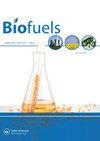蔗渣生物乙醇合成中金属纳米颗粒包合工艺参数的优化
IF 2.6
4区 工程技术
Q3 ENERGY & FUELS
引用次数: 0
摘要
纳米催化剂在乙醇等生物工艺操作中的应用有助于提高工艺效率,并补充了生物炼制操作的优化研究。本研究对蔗渣生产生物乙醇过程中影响纳米颗粒包合的工艺变量进行了统计建模和优化。采用深层发酵技术生产生物乙醇。采用响应面法(RSM),考虑四个参数,即:采用Box Behnken设计,对SCBH浓度(g/l)、氧化铁(III)纳米颗粒(Fe3O4 NPs)浓度(w/v)、时间(h)和pH进行了变化。采用二次元模型对工艺变量进行了分析和拟合。结果表明,纳米颗粒质量分数为0.04 (w/v), pH为4.5,发酵时间为12 h,乙醇浓度为42 g/l,乙醇得率为32%。结果表明,该工艺的最佳工艺条件为平均乙醇得率32.7%。研究证实纳米颗粒包合物对生物乙醇的产率有显著影响。在最佳条件下,生物乙醇产量的提高为蔗渣生产生物乙醇的规模化发展奠定了纳米颗粒包合的重要意义。本文章由计算机程序翻译,如有差异,请以英文原文为准。
Optimization of process variables for metallic nanoparticle inclusion in bioethanol synthesis of sugar cane bagasse
Abstract Nano catalyst inclusion in bioprocesses operation such as ethanol help increase process efficiency and complement optimization studies for biorefinery operations. In this study, process variables affecting nanoparticle inclusion in the production of bioethanol from sugar cane bagasse were statistically modeled and optimized. Production of bioethanol was done using the submerged fermentation technique. Response Surface Methodology (RSM) was used to model the process by considering four parameters viz; SCBH conc (g/l), iron (III) oxide nanoparticles (Fe3O4 NPs) concentration (w/v), time (h), and pH which were varied using Box Behnken Design. The process variables were analysed and fitted using the quadratic model. The findings revealed the optimal condition of 0.04 (w/v) of nanoparticle, pH of 4.5, time at 12 h, and SCBH concentration of 42 g/l resulting in the bioethanol yield of 32%. The predicted optimal condition was validated in replicate and the average of 32.7% yield of ethanol was obtained. The study confirms nanoparticle inclusion has a significant effect on the yield of bioethanol. The increasing bioethanol yield, at the optimum conditions established the significance point of nanoparticle inclusion for the scale-up development of bioethanol production from sugar cane bagasse.
求助全文
通过发布文献求助,成功后即可免费获取论文全文。
去求助
来源期刊

Biofuels-Uk
Energy-Renewable Energy, Sustainability and the Environment
CiteScore
5.40
自引率
9.50%
发文量
56
期刊介绍:
Current energy systems need a vast transformation to meet the key demands of the 21st century: reduced environmental impact, economic viability and efficiency. An essential part of this energy revolution is bioenergy.
The movement towards widespread implementation of first generation biofuels is still in its infancy, requiring continued evaluation and improvement to be fully realised. Problems with current bioenergy strategies, for example competition over land use for food crops, do not yet have satisfactory solutions. The second generation of biofuels, based around cellulosic ethanol, are now in development and are opening up new possibilities for future energy generation. Recent advances in genetics have pioneered research into designer fuels and sources such as algae have been revealed as untapped bioenergy resources.
As global energy requirements change and grow, it is crucial that all aspects of the bioenergy production process are streamlined and improved, from the design of more efficient biorefineries to research into biohydrogen as an energy carrier. Current energy infrastructures need to be adapted and changed to fulfil the promises of biomass for power generation.
Biofuels provides a forum for all stakeholders in the bioenergy sector, featuring review articles, original research, commentaries, news, research and development spotlights, interviews with key opinion leaders and much more, with a view to establishing an international community of bioenergy communication.
As biofuel research continues at an unprecedented rate, the development of new feedstocks and improvements in bioenergy production processes provide the key to the transformation of biomass into a global energy resource. With the twin threats of climate change and depleted fossil fuel reserves looming, it is vitally important that research communities are mobilized to fully realize the potential of bioenergy.
 求助内容:
求助内容: 应助结果提醒方式:
应助结果提醒方式:


